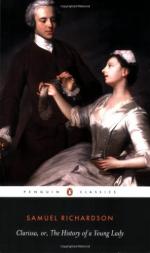I led him into the parlour, and presented him to the women, and them to him. I thought it highly imported me (as they might still have some diffidences about our marriage, from my fair-one’s home-pushed questions on that head) to convince them entirely of the truth of all I had asserted. And how could I do this better, than by dialoguing a little with him before them?
Dear Captain, I thought you long; for I have had a terrible conflict with my spouse.
Capt. I am sorry that I am later than my intention—my account with my banker—[There’s a dog, Jack!] took me up longer time to adjust than I had foreseen [all the time pulling down and stroking his ruffles]: for there was a small difference between us—only twenty pounds, indeed, which I had taken no account of.
The rascal has not seen twenty pounds of his own these ten years.
Then had we between us the character of the Harlowe family; I railed against them all; the Captain taking his dear friend Mr. John Harlowe’s part; with a Not so fast!—not so fast, young gentleman!—and the like free assumptions.
He accounted for their animosity by my defiances: no good family, having such a charming daughter, would care to be defied, instead of courted: he must speak his mind: never was a double-tongued man.—He appealed to the ladies, if he were not right?
He got them on his side.
The correction I had given the brother, he told me, must have aggravated matters.
How valiant this made me look to the women!—The sex love us mettled fellows at their hearts.
Be that as it would, I should never love any of the family but my spouse; and wanting nothing from them, I would not, but for her sake, have gone so far as I had gone towards a reconciliation.
This was very good of me; Mrs. Moore said.
Very good indeed; Miss Rawlins.
Good;—It is more than good; it is very generous; said the widow.
Capt. Why so it is, I must needs say: for I am sensible that Mr. Lovelace has been rudely treated by them all—more rudely, than it could have been imagined a man of his quality and spirit would have put up with. But then, Sir, [turning to me,] I think you are amply rewarded in such a lady; and that you ought to forgive the father for the daughter’s sake.
Mrs. Moore. Indeed so I think.
Miss R. So must every one think who has seen the lady.
Widow B. A fine lady, to be sure! But she has a violent spirit; and some very odd humours too, by what I have heard. The value of good husbands is not known till they are lost!
Her conscience then drew a sigh from her.
Lovel. Nobody must reflect upon my angel!—An angel she is—some little blemishes, indeed, as to her over-hasty spirit, and as to her unforgiving temper. But this she has from the Harlowes; instigated too by that Miss Howe.—But her innumerable excellencies are all her own.




